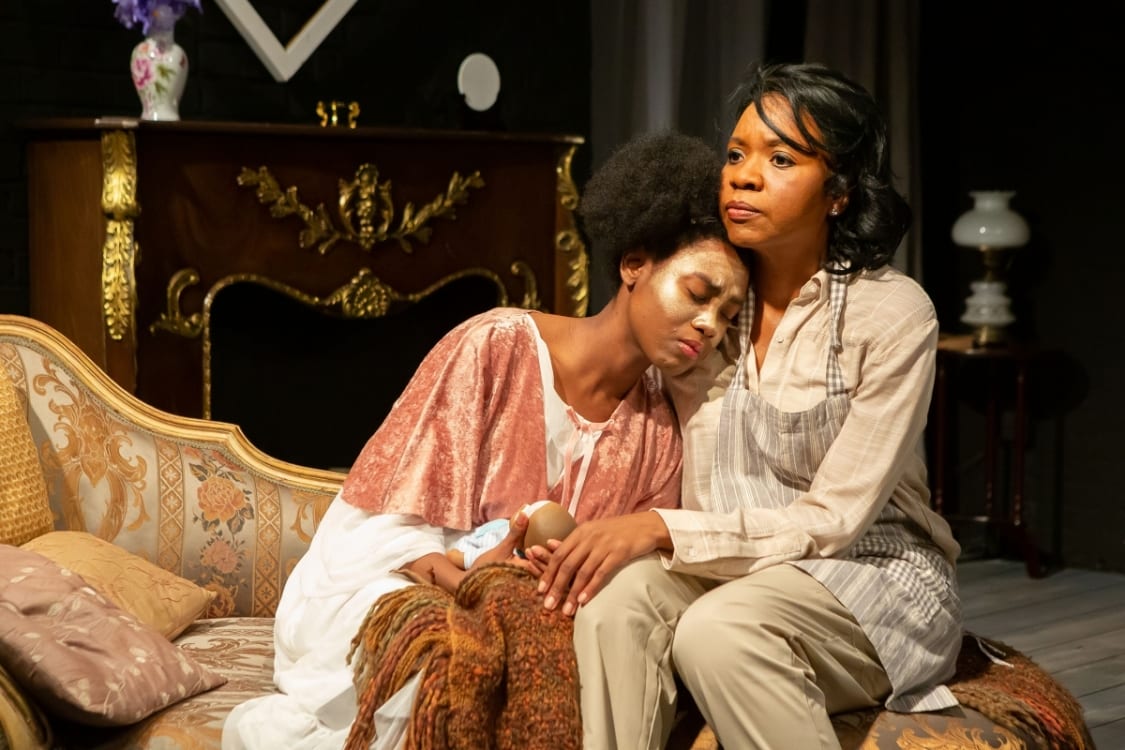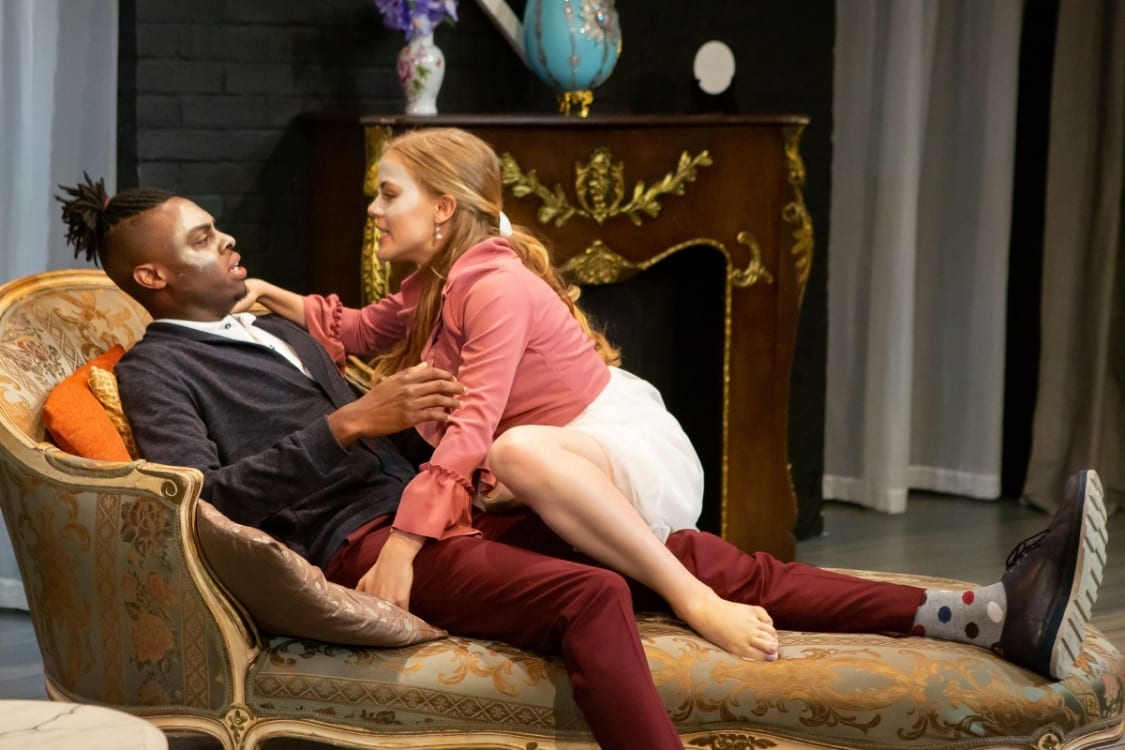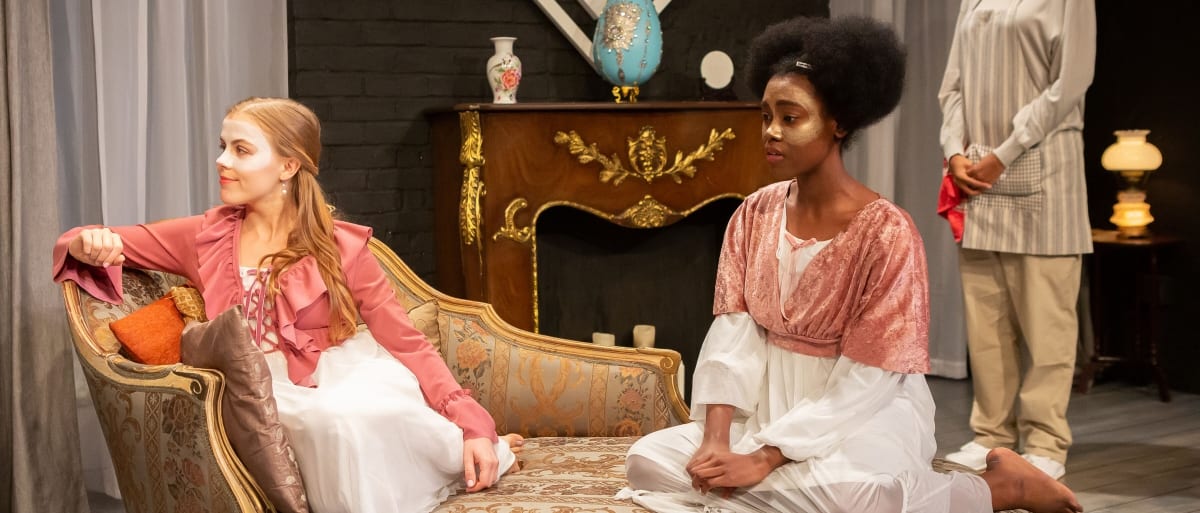There exists plenty of lore about writers who get haunted by literary greats to finish their works. (Tales of Alexander Hamilton haunting Lin-Manuel Miranda to finish Hamilton is but one example.) One seldom hears about writers getting haunted by fruit. In The Great Novel, it is a recurring theme: a grandmother nicknamed Peaches repeatedly asks of her granddaughter Bertha’s budding book: “Where are the mangoes?”
Bertha (Nikki E. Walker) is the maid for a present-day, wealthy New York family whose elegant living room and uppity demeanor deliberately evoke the atmosphere of a slavery-era Southern plantation. She is trying to write “the greatest novel in the world,” but her 10 years of serving the Brennan family sans gratitude have left her stuck in a rut of believing hackneyed stock plots with thin, English white girls falling in love are the only way to a successful story. The ghost of her grandmother (Madeline McCray) persistently haunts Bertha to remind her that stories of her Jamaican heritage are worth writing, too, and Bertha need only break from her own role as the perfect, demure housekeeper to truly believe it.

The irony of this show is that, in its quest to reject timeworn plots and Eurocentric standards of worth and success, the tale of a trapped woman who rejects convention, discovers herself, and breaks free is itself a timeworn, easily predictable plot. It lacks surprise save the revelation of a family secret, and even that is promptly dropped and given no development after the initial declaration. And yet, predictability aside, The Great Novel is overall successful enough. Its steadily driving pace keeps it engaging, and the characters are skillfully acted.
The characters, like the plot, also reflect common tropes. There’s Dick Brennan (Joshua Bermudez), the stern, aloof patriarch who believes showering his children with objects equals love. He has two daughters: the spoiled Charlotte (MaryKathryn Kopp) and the sweet Anne (Tabatha Gayle) who wants something more fulfilling in life than things. Saul, the eldest brother (Michael Aguirre), is the family’s black sheep – a drug addict, as nihilistic as they come, and not wanting much of anything. Finally, Charlotte’s British boyfriend Potter gets thrown in the mix for good measure. Although finely played by Oghenero Gbaje, he’s written mostly as a way for Charlotte to try and play out her fantasies about crafting her life like a romance novel. The little we learn about him as an individual – he wants to join the army, he’s a video game enthusiast – becomes fodder in service of Charlotte’s character.

Kopp plays a larger-than-life, excellently bratty Charlotte who is Romanticism personified: draping herself across couches to cry, staring wistfully out at fog, and being entranced by the thought of running off with a lover into nature. Come to think of it, all the characters personify a literary genre. Granny is metamodernism, breathing new life into age-old fables, and McCray stands out as a natural-born storyteller who can make the ordinary entrancing. Aguirre also stands out for his wry performance as Saul, the textbook existentialist who has a sneaky way of making you root for him more than you might expect. Bertha’s entire character arc traces her shift from classicism to that same metamodernism. Gayle, as Anne, oozes postmodernism in the endearing way she questions the importance of her wealth and seeks something higher. Dick sees himself realism but is clearly absurdism, and Bermudez navigates his character’s perceptive disjuncture well.
The Great Novel isn’t the most revolutionary play in the way Bertha’s book aims to be. But McCray’s talent for crafting a Jamaican landscape from words is nothing short of exceptional. Dick’s impassioned love for a Tiffany egg and Granny’s utter disgust for the sculpture is one of multiple comic points. And something – perhaps that added layer of literary significance – draws you to these characters although you know you’ve seen them before, makes them less trite, more compelling and, well, somewhat novel. Pun intended.

